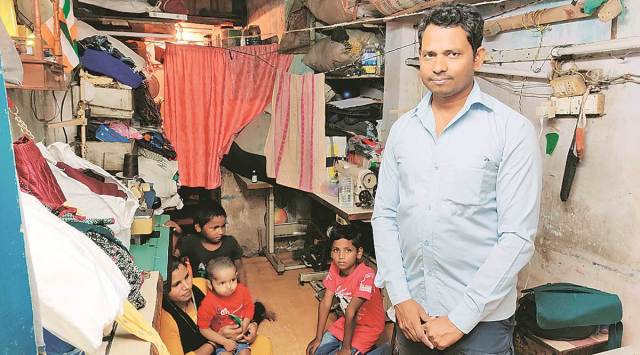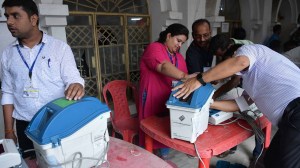- India
- International
New urban poor in Mumbai — No demand, self-employed hardest hit: Socha na tha ki haath phailana padega
Baudh’s is a story playing out across the city as the Covid lockdown winds down but small businesses don’t know where the keys to demand are.
 Akash Baudh, who employed 15 workers until March, has moved into his workshop with his family. (Express photo by Mayura Janwalkar)
Akash Baudh, who employed 15 workers until March, has moved into his workshop with his family. (Express photo by Mayura Janwalkar)Their ghar is gone because the rent cannot be paid so the Baudh family has moved to their karkhana whose owner has given them some time to pay.
Seated on its floor in a chawl near Juhu Gally, Anant (8), Arpit (6) and Anshika (2), watch a Marathi children’s rhyme on the only smartphone they have. This was where workers employed by their father Akash Baudh stitched garments until the lockdown in March. This has been the Baudh home through the months of the lockdown after he moved out of his rented house, unable to make the Rs 14,000 monthly rent. This room, its monthly rent of Rs 8000 pending for six months, has six industrial sewing machines and swathes of fabric wrapped in plastic. In a corner is a stove, a gas cylinder and some utensils.
Since March, he has sold eight of his 15 sewing machines to pay his bills. Bought at Rs 17,000 per unit, he parted with the five-year-old machines for Rs 7,000 each. “Aap sochiye agar mera yeh haal hai toh mere neeche ke karigar ka kya haal hoga (Imagine if this is my state, what’s the plight of the workers I employ.)” said Baudh.
Baudh’s is a story playing out across the city as the Covid lockdown winds down but small businesses don’t know where the keys to demand are. Since he fled his Mau home in UP when he was 15, tormented by upper-caste schoolmates and teachers, he said, Baudh did odd tailoring jobs and stitched his own Mumbai story by growing his business to employ 15 workers. He sold garments to retailers selling mostly on footpaths. Every month, he made at least Rs 20,000 over and above salaries, rent and utility bills.
Also Read | Mumbai: Patients seeking plasma therapy a harried lot as blood banks want replacement donors

After six months of the lockdown, however, Baudh has his back against the wall. He has over Rs 1 lakh in unpaid rent and the balance in his bank account is as good as zero.
“I had workers from UP, Bihar, West Bengal. As soon as Janata curfew was announced on March 22, I bought tickets for all of them, sent them home, but after that I was left with nothing. And there was no earning,” said Baudh.
His wife Seema and he are both skilled dressmakers and desperately looking for work. “I am ready to do any kind of work. Stitch, drive or run somebody’s shop but I need work immediately,” said Baudh.
The young father of three is among thousands in Mumbai yet to the see any glimmer at the end of the lockdown tunnel. Surviving on donated rations but unable to qualify for relief schemes, their informal business out of the safety nets announced by the government, they are struggling to stay afloat.
“Kabhi socha nahi tha kisi ke aage haath phailana padega (I had never thought I would have to beg someone for favours),” said Syed Lateef Habib (52), a widower and a father of two daughters aged ten and seven. Habib earned Rs 15,000 a month. He said the family lived comfortably in their rented home in Naigaon, a distant suburb in the neighbouring Vasai-Virar belt where Habib worked as an autorickshaw driver.
In April, days after the COVID-19 pandemic struck, work came to a standstill and he left his daughters with his sister in Khar and he, meanwhile, found a temporary home in a community kitchen-cum-training centre run by NGO Ghar Bachao, Ghar Banao Andolan in the Ambujwadi slum in Malad.
“I had to vacate my rented room because I hadn’t made any money for rent. I sleep here,” he said pointing to the community kitchen. Habib helps out with whatever is needed like carrying heavy jerry cans of water to cook the rice and odd plumbing jobs occasionally making a few hundred rupees.
He is behind on repaying a loan of Rs 2.10 lakh he took to buy his autorickshaw, of which Rs 40,000 remain unpaid. “I have made no money in over six months. How will I repay the loan? I have no money for fuel or maintenance of my rickshaw either,” he said.
In the pandemic scare, single parent Manju Raju Sable, had to give up her job as a housekeeper in Chembur as she feared using public transport would expose her and her two daughters to the virus. During the lockdown, she got her eldest 20-year old daughter married.
“I realised that I had to start my search for a living afresh,” said Mankhurd resident Sable, recalling her struggle to dust herself up after her husband left her. She mortgaged her jewellery for Rs 15,000 to start a small business.
With the money from her mortgage set aside for daily expenses, she travels to the APMC market in Vashi, Navi Mumbai, nearly 10 km away where, like many women, she buys garlic in sacks, carries them home. “Since local trains are yet to resume service for all, very few of them come to buy the garlic. I end up selling most of it to locals here,” Sable said. This fetches around Rs 8000 a month that she uses for living expenses.
Raju Nadar’s Idli-Dosa stand on a footpath near the Income Tax Office at Churchgate was staple breakfast for officegoers for 35 years. For the last six months, however, Nadar had to wind up his business. He owes his landlord Rs 20,000 in rent for a room he shared with five in a Wadala chawl. His wife, back in their village Karaikudi in Tamil Nadu, has had to pawn a gold chain to a local jeweller for Rs 30,000, to help her husband tide over the lockdown months in Mumbai.
“We could make Rs 4,000 a day easily before the lockdown and after paying my assistants I would still make about Rs 15,000-Rs 20,000 a month and have about Rs 5,000 to send back to my family,” said Nadar. With no income and unexpected expenses, Nadar said he has been tested like never before.
“Back home, we didn’t have a phone for that but my son had to attend his B.Sc lectures. I had to ask my sister to buy him a phone worth Rs 9,000 so he could attend class,” said Nadar.
It’s been a week since Nadar has been open for business again. “The crowd is not even 20 percent of our usual customers. It is difficult to make even Rs 2,000 a day at this rate. We have to keep trying since we have nothing else to fall back on,” says Nadar.
In June, the Pradhan Mantri Street Vendors AtmaNirbhar Nidhi Yojana was announced to facilitate working capital loan up to Rs 10,000 for street vendors and hawkers. Hairder Imam, General Secretary of the All Indian Trade Union Congress ( AITUC) Hawkers’ Union, that has about 6,500 members, said so far none of their union members has benefited.
“The BMC had asked us and all our union members to fill forms for the scheme but most of us got a message from the bank stating our application was found ineligible. No reasons were given, the scheme seems like something done to contain the anger of the poor,” he said.
Across India, about 2 lakh street vendors have been given the interest-free loan so far of the over 20 lakh who applied.
Pankaj Kumar, Development Commissioner (Unorganised Labour), said his office has got requests for help from several of about 300 occupations that come under unorganised labour. “Whoever was self-employed has been affected the most…Many establishments have begun work but we cannot say that everyone who was working prior to the lockdown has found work again. We are working towards mitigating the problems they are facing,” said Kumar.
That’s not going to be easy given the lack of clear targeting mechanisms, said Amita Bhide, Dean, School of Habitat Studies at the Tata Institute of Social Sciences. “The entire economy has faced losses and the formal and informal sectors are intertwined. So while the formal sector revives that may bring decent opportunities, but to fewer people. This may cause an increase in the proportion of destitution,” she said.
Apr 19: Latest News
- 01
- 02
- 03
- 04
- 05






































